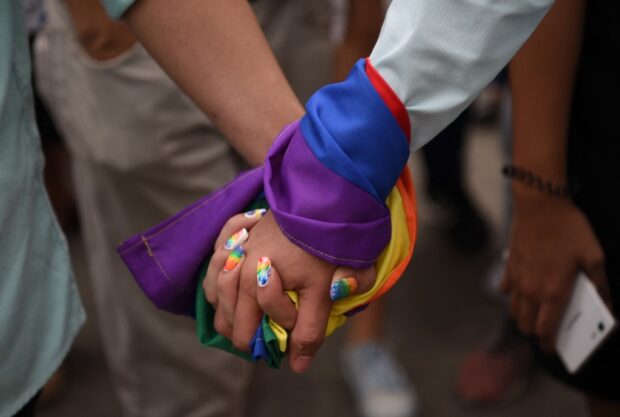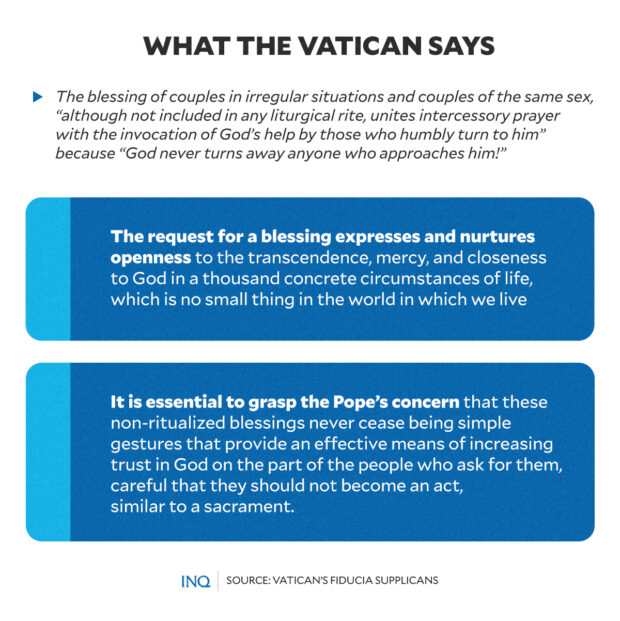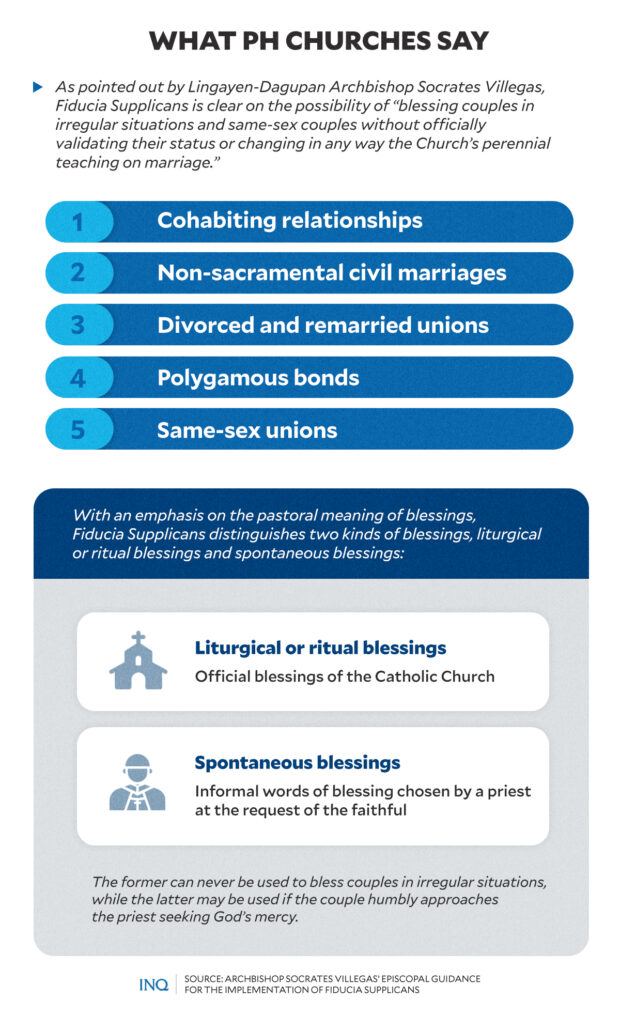Fiducia Supplicans: Blessing, not marriage, for same sex couples

A couple holds hands wrapped in a rainbow flag as thousands of Lesbian Gay Bisexual Transgender/Transexual Queer (LGBTQ) members hold a pride march at a sports complex in Marikina City in this file photo taken on June 30, 2018. AFP Photo
MANILA, Philippines—It is now possible for a priest to bless couples of the same sex and couples in irregular situations with the release of the document Fiducia Supplicans by the Vatican Dicastery for the Doctrine of the Faith.
The declaration, which was released on Dec. 18, was reviewed and approved by Pope Francis, who was elected to the pontificate in 2013 after the resignation of Pope Benedict XVI.
However, its release has stirred controversy, with some expressing strong opposition, while others coming forward to back the document, which has been prepared in “consultation with experts.”
As stressed by the Dicastery, there was a “careful drafting process” and that the content of the document was discussed in the Congresso of its Doctrinal Section.
‘Landmark’
Caloocan Bishop Pablo Virgilio David, the president of the Catholic Bishops’ Conference of the Philippines, said that Fiducia Supplicans is “clear in its content and intent.”
RELATED STORY: Dark reality: Gay people struggles persist after coming out
He pointed out that in the document, the prefect of the Dicastery stressed that “this declaration remains firm on the traditional doctrine of the Church about marriage.”
As Victor Cardinal Fernandez said, Fiducia Supplicans is not allowing any type of liturgical rite or blessing similar to a liturgical rite that can create confusion as to the blessing reserved for the Sacrament of Marriage.

GRAPHIC Ed Lustan
Based on the document, marriage is the “exclusive, stable, and indissoluble union between a man and a woman, naturally open to the generation of children.”
So essentially, as stressed by Tuguegarao Archbishop Ricardo Baccay, the declaration “recognizes that persons in problematic and difficult situations […] may ask to be blessed.”
These individuals, he said, are same-sex couples, divorced couples, persons living as spouses without the benefit of marriage, convicts and persons detained on charges of serious crime.”
RELATED STORY: K-12 revisions tackle same-sex unions, gender discrimination
Baccay explained in an instruction for the priests and lay leaders of Tuguegarao that “to refuse them a blessing when they sincerely ask for it would be arrogance and insensitivity that are alien to the Gospel.”
‘Compassionate’ God
As stated in the document, the blessing of same-sex couples and those in irregular situations, “although not included in any liturgical rite, unites intercessory prayer with the invocation of God’s help by those who humbly turn to him.”
“God never turns away anyone who approaches him,” it said.
The Dicastery pointed out that request for a blessing expresses and nurtures openness to the transcendence, mercy, and closeness to God in a thousand concrete circumstances of life.
It stressed that it is essential to grasp the Pope’s concern that the “blessing” never ceases being simple gestures that provide an effective means of increasing trust in God on the part of the people who ask for them.”
The minister who will give the blessing, however, should be careful so that the blessing should not become a liturgical, or even a semi-liturgical act, that is indistinguishable to a sacrament.
“Precisely in this regard, Pope Francis urged us not to “lose pastoral charity, which should permeate all our decisions and attitudes” and to avoid being “judges who only deny, reject, and exclude,” the Dicastery said.
This, as it stressed that one who asks for a blessing shows himself to be in need of God’s saving presence in his life and one who asks for a blessing from the Church recognizes the latter as a sacrament of the salvation that God offers.
RELATED STORY: The fight for marriage equality
“To seek a blessing in the Church is to acknowledge that the life of the Church springs from the womb of God’s mercy and helps us to move forward, to live better, and to respond to the Lord’s will,” it said.
Understanding blessings
As pointed out by the Dicastery, there is a need for a broader understanding of blessings.
“To help us understand the value of a more pastoral approach to blessings,” it said Pope Francis is asking people to contemplate, with an attitude of faith and fatherly mercy, the fact that “when one asks for a blessing, one is expressing a petition for God’s assistance, a plea to live better, and confidence in a Father who can help us live better.”

GRAPHIC Ed Lustan
“This request should, in every way, be valued, accompanied, and received with gratitude.”
Lingayen-Dagupan Archbishop Socrates Villegas explained that Fiducia Supplicans distinguishes two kinds of blessings—liturgical or ritual blessings, which are the official blessings of the Church, and spontaneous blessings, which are the informal words of blessing chosen by a priest at the request of the faithful.
“It then affirms that the former can never be used to bless couples in irregular situations, while the latter may be used if the couple humbly approaches the priest seeking God’s mercy,” he said.
Villegas pointed out that when a priest prays a blessing of mercy on a couple in an irregular situation, who “desire to entrust themselves to the Lord and his mercy, to invoke his help, and to be guided to a greater understanding of his plan of love and of truth,” he is asking God to have pity on both of them and to give them the grace of conversion so that they can regularize their relationships.
“This blessing of mercy is not and cannot be a blessing of sanctification since we cannot ask God to bless something that, as Fiducia Supplicans explains, is not ‘conformed to God’s will, as expressed in the teachings of the Church’.”
“Priests who are invited to bless couples in irregular situations should choose the appropriate words to reveal this intent of the Church,” he said.